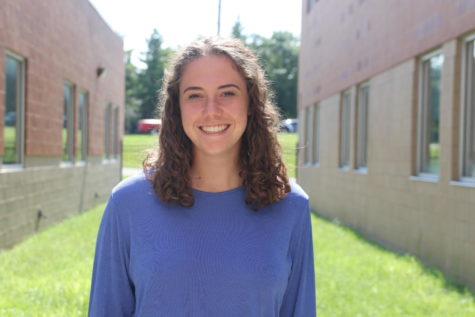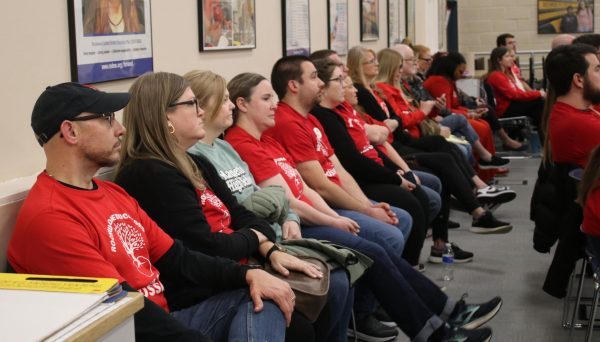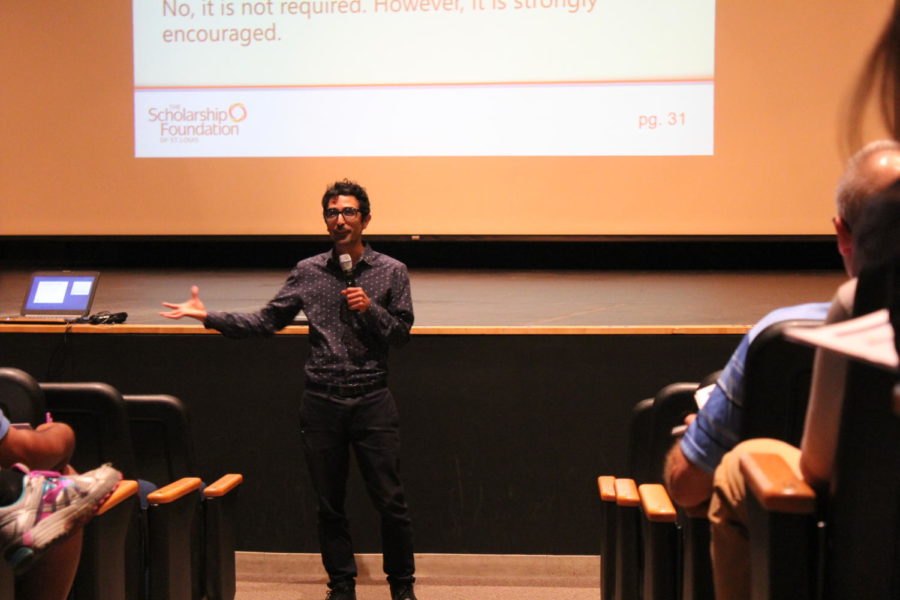New Speaker Discusses Financial Aid
Media by Alayna Higdon
Félipe Martinez from the Scholarship Foundation speaks to students and parents about FAFSA.
Korinne Snipes, senior, spends a lot of her time working on her college essays and scholarships. As Snipes focuses on the application process, her dad, Kevin, is eager to learn more about the parents’ end of college: the finances.
Kevin was one of many parents who attended a financial aid presentation on Thursday by the Scholarship Foundation of St. Louis, lead by Félipe Martinez.
“This is our first time applying for college and financial aid,” Kevin said. “I thought it would be good to get all the information we could.”
With three students at MHS, Kevin is gaining information to steer his way through the college financial process.
Devon Spyers and Daniel Goninan, MHS college career counselors, helped set up the presentation with the Scholarship Foundation. The speaker’s focus was to stress the financial aspects of college.
“College can get super expensive if you’re not careful,” Spyers said. “Nobody wants to start college in debt with no money to their name.”
Apart from college tuition, room, board and books, Spyers also urges students to keep in mind other unexpected expenses of college, like food, laundry and social events.
The Thursday speaker was set up last spring to talk about financial aid, specifically answering any questions and concerns about the Free Application for Federal Student Aid (FAFSA).
The Scholarship Foundation speaker, Félipe Martinez, is a student advisor and the immigrant student advisor. Martinez works to support St. Louis students’ access to post-secondary education and financial aid.
“A student’s well-being and priorities must be my priorities,” Martinez said. “Students cannot be standardized, each person is a unique individual.”
Martinez focuses on each student rather than on a standardized system.
During the presentation, Martinez hit on three major points: apply to FAFSA as early as possible, don’t pay for application help and always ask questions.
The FAFSA calculates the Expected Family Contribution (EFC), which is a number that the Department of Education uses to determine how much money a family can reasonably pay for one year.
Martinez recommends that students start thinking about college plans early. For seniors, Martinez urges students to apply for everything.
“If you don’t apply, you might [never] know,” Martinez said. “Don’t count yourself out of an opportunity before you apply for it. Apply and let someone tell you that you get it or you don’t.”
Reflecting on the presentation, Kevin Snipes said he gained new information.
“I got a little more in-depth knowledge about the income information questions that they (FAFSA) ask,” Snipes said. “With the cost of school these days, any assistance you can get is great.”
FAFSA is open for students from Oct. 1 through June 30.
Your donation will support the student journalists of Marquette High School. Your contribution will allow us to purchase equipment and cover our annual website hosting costs. You may become a PATRON by making a donation at one of these levels: White/$30, Green/$50, Blue/$100. Patron names will be published in the print newsmagazine, on the website and once per quarter on our social media accounts.

Alayna Higdon, senior, is a staff reporter for the Messenger. This year, she will serve as Mock Trial co-president. She also participates in Politics Club,...







